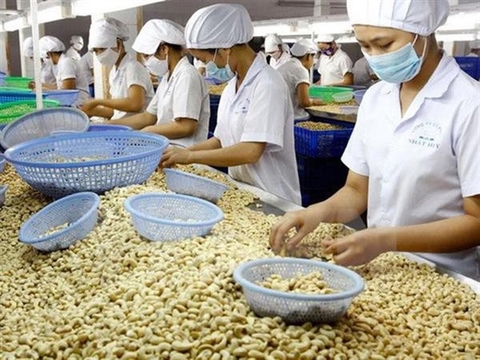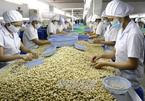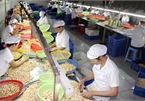 |
|
Workers process cashew nuts for export. The country shipped 450,000 tonnes abroad last year, earning more than US$3.6 billion. — Photo the courtesy of Vinacas
|
The country shipped 450,000 tonnes of cashew abroad last year, earning more than US$3.6 billion. Viet Nam also imported 1.6 million tonnes of raw cashew with a turnover of more than $2 billion.
Pham Van Cong, chairman of the Viet Nam Cashew Association (Vinacas) told Viet Nam News the consumption and export of cashew nuts undergoing deep processing, such as salted/honey roasted nuts and cashew nut candies and cookies, witnessed sharp growth.
“Vietnamese cashew enterprises have also been increasingly active in the supply of raw materials, production improvement and business efficiency enhancement,” Cong said.
Last year, Tan Long Group signed a contract to purchase 176,000 tonnes of Tanzanian raw cashews from the 2018 season with Tanzania's Cereals and Other Produce Board. This is the largest raw cashew purchase contract in history, bringing a wealth of cashew nuts to the Vietnamese industry.
But amid the volatile situation, Cong said quality problems have aroused such as the moisture content, number of kernels per kilogramme, deformed nuts, and foreign matters affecting quality, as well as issues about food safety and hygiene.
“To ensure quality, food safety and hygiene, it is necessary to have technical regulations for since this will be a legal basis for Vietnamese companies when negotiating contracts with foreign suppliers and for resolving trade disputes,” Cong said.
Last year the agriculture ministry and the Ministry of Science and Technology promulgated the Viet Nam National Standards (TCVN12380:2018) for raw cashew nuts.
This is applied for the inspection, evaluation, and classification of imported raw cashew and in resolving disputes.
Vinacas encourages its members to apply it when negotiating, signing and implementing contracts, Cong said.
Consolidate the throne
Although holding the title “the world’s No 1 exporter”, Viet Nam still mainly exports semi-processed cashew nuts, which are sold at an average price of $10 per kilogramme, while finished products sold at supermarkets globally cost about $30 per kilogramme.
Nguyen Minh Hoa, Vinacas Vice Chairman told Viet Nam News that 2020 was an unpredictable year because of tcomplicated developments in the international economy, including the US-China and US-India trade conflicts and the protection policies of countries exporting raw cashew and cashew nuts.
India, one of the world’s largest cashew nuts consumption markets, is applying a tax policy to limit the amount of imported cashew nuts, mainly from Viet Nam, Hoa said, adding that the Chinese market was also gradually tightening the quality standards of imported agricultural products.
“If businesses do not promptly adjust to meet new requirements, they will find it difficult to enter these large markets,” Hoa said.
The giant roasters of the US and Europe also said they were about to set out additional food safety standards and would vigorously check the amount of chemicals used in imported cashew nuts as supermarkets in these two markets were increasingly stricter in terms of food safety, Hoa said.
According to Pham Van Cong, chairman of the Viet Nam Cashew Association, the cashew sector aims to earn $4 billion in exports in 2020.
Vinacas would make efforts to improve the quality of machinery and equipment to enhance processing capacity and efficiency, including intensive processing; continue to co-operate with the cashew associations of countries with large cashew nuts output such as India and the Ivory Coast in production and trading of processed cashew nuts.
Enterprises in the cashew industry need to keep a close watch on market movements, especially in terms of supply and demand, focusing on the co-operation and information exchange with other enterprises and adjusting to have a considerate and realistic 2020 plan.
According to Minister of Agriculture and Rural Development Nguyen Xuan Cuong, although Viet Nam cashew industry has plenty of opportunities to develop, the country still needs to solve the three challenges related to raw materials, processing and market access, otherwise it will lag behind and deteriorate.
In the future, the cashew industry should focus on solutions to strengthen links between businesses and farmers, apply science and technology, improve sector and regional planning, Cuong said.
Nguyen Khac Hai, General Director of PAN Group, told Viet Nam News the company would set up a research institute to produce cashew high-quality and high-yield cashew varieties.
“The PAN Group will support the cashew cultivation and consumption for farmers to link cashew products to global value chains. PAN Group will implement a pilot model on a material area of 10,000 hectares in the southern province of Binh Phuoc, then replicate the model and transfer technology to households and cooperatives in the region,” Hai said. — VNS

Industry calls for national technical regulation for raw cashew
The Vietnam Cashew Association wants the Ministry of Agriculture and Rural Development to draft national technical regulations for raw cashew nuts so that processors can ensure the quality of imported raw material.

Vietnam's cashew exports to exceed target, says industry
Vietnam’s cashew exports in 2019 are expected to top US$3.6 billion, according to the Viet Nam Cashew Association (Vinacas).
 Viet Nam stood out as the world’s largest cashew exporter last year but there remains many challenges ahead for the country to retain its leading position in the future.
Viet Nam stood out as the world’s largest cashew exporter last year but there remains many challenges ahead for the country to retain its leading position in the future.